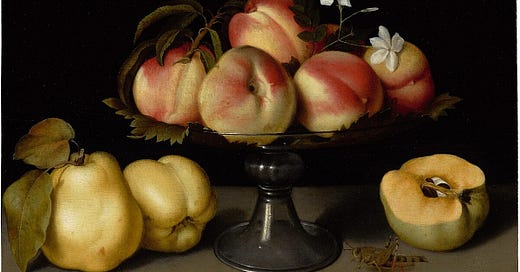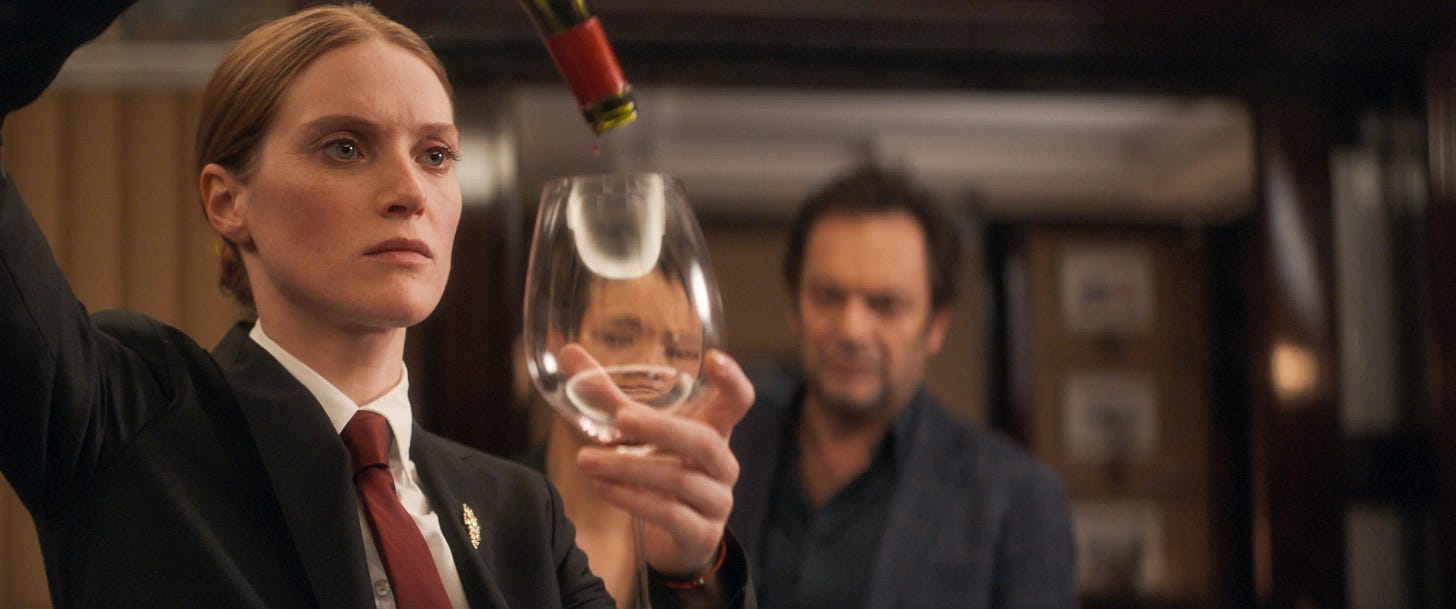Red Wine Supernova
Seriously, do you know about the trilingual prestige wine-tasting family melodrama?
Mel was sick, which is the only reason why she was watching TV in the middle of the day. (I watch TV in the middle of the day every day because I am sick.) When we talked on the phone at lunch, she asked if I’d ever heard about a series called Drops of God on Apple TV+. I hadn’t! She’d watched one episode at random, it was “very weird,” and she paused because she thought it might be something we’d want to watch together. Honestly, having now seen most of the first season, I wonder if Mel called me partly to make sure she wasn’t hallucinating it. Please confirm this is actually something that exists. I told her that, from her description — Succession meets Sideways — I was definitely interested, so I watched the first episode by myself that night to catch up, and now, we together, are most of the way through one of the most baffling televisual journeys I’ve ever been on. Drops of God is real. And it’s spectacular.
There’s nothing more joyful, as a TV critic, than when I get to tell you about a show so bananas, so inadvisably strange, that it delights me to even think about it. A show whose apparent ability to navigate the craven maze of the streaming ecosystem to get written, paid for, and put on a platform genuinely boggles the mind. The show does not necessarily have to be good to be miraculous in this way. In other words, I’m not talking about the ingenious avant-garde experiments of Boots Riley’s I’m a Virgo or even Julio Torres’ Los Espookys. These shows announce their strangeness, their non-conformity. I’m not talking about those shows. I’m talking, instead, about normie shows, prestige-bait shows that, through some rare accident of algorithmic decision-making and savvy pitchwork make their way to our screens, way weirder than they have any right to be. I’m talking about Drops of God.
Let me tell you about this show.
The first thing to know about Drops of God is that it is a show about high-stakes, competitive wine-tasting. I don’t want to reveal too much about the plot because — if this wasn’t clear — I very much want you to watch it, but there are more twists and turns in a mere description of this show’s premise than occur in a full season of most series. So, the infamously irascible genius wine critic Alexandre Léger is dead. It is important to know, before I proceed any further, that, in the world of this show, wine critics are massive global celebrities. This is not, mind you, an alternate history show in which this alteration is a major plot point. Rather, the show depends upon this relatively massive, but completely unremarked revision to our existing reality in order for literally any of what transpires to make sense. Oenologists are swarmed with paparazzi, the death of the author of a well-known annual wine guide is global news, sommeliers are like unto gods.
Léger — a French expat who lived in Japan until his death — was the owner of o ne the most impressive wine collections in the history of the universe, valued at $150 million. In his will, he stipulates that his estate transfer to the winner of a three-round wine-tasting competition between his daughter and his star student (who he calls his “spiritual son”). His daughter, Camille, grew up estranged from her father. We see him in flashback brutally cultivating the child Camille’s palate — they’re in a dark barn, she’s blindfolded sipping whites and reds, tasting small chunks of pear and dirt, he’s barking at her and pounding the table when she guesses a note wrong — while also handcrafting an artisanal trauma for her to overcome in her adulthood. When we meet her, Camille, a successful author, remains so fucked up by this adolescent sommelier training, that flavor itself triggers a catastrophic psychosomatic response when she encounters it. Flavor. She only eats rice and green beans, and if even a drop of wine passes her lips, she hallucinates a terrifyingly loud series of colorful explosions, gets a nosebleed, and immediately passes out cold. This happens several times in the first episode.
So that’s Camille. Issei Tomine, Leger’s prized pupil, is a different type of dude. He is the upsettingly handsome heir to the Tomine Diamonds fortune — a position that also, inexplicably, makes him a huge international celebrity — and three-quarters of the way through the show, so far, he has made one single facial expression. While wine is Camille’s birthright, Issei has defied his family’s hatred of the wine industry — a bone-deep abhorrence that only becomes less explicable the more they try to explain it — to pursue oenology and set up a small business dedicated to, I don’t know, consulting corporations about wine-related issues? But, man, he is so good at wine-tasting! One time in the pilot, he doesn’t even need to drink the wine to identify its specific vintage. He just smells that shit.
All of this information is communicated in the very first episode. And let me tell you: it just keeps going.
Drops of God is based — apparently, pretty loosely — on a popular Japanese manga. One meaningful alteration is that the main character has been transformed from a Japanese man into Camille, a French woman. The show is performed in Japanese, French, and English, sometimes all within the same scene, and globetrots between Tokyo, the French countryside, and Italy. I’d suspect this polyglot style was key to a show this bizarre getting greenlit by Apple. (Having a hit that crosses national boundaries is a huge boon for any streamer.) And that, maybe, is the accident of this show’s birth. Perhaps its conceptual prospect as a moneymaker temporarily blinded its producers to the strangeness of the thing itself — a market logic not selecting for, but stumbling into, a genuine creative risk.
I realize this is a pessimistic hypothesis. And the industry is filled with creative writers, directors, and producers doing good work and/or struggling to get their work made. But there hasn’t been a lot of evidence recently that would make us feel anything other than pessimistic about the intentions of the executive class running the TV industry these days. Maybe not an accident, then, but a heist, a rope-a-dope, a Chambolle-Musigny Premier Cru Les Amoureuses 2001 funneled craftily into a two-buck-Chuck bottle. However the joy came to us, though, it’s here.
STUFF I WROTE
As it’s been about five months since the last time I sent out one of these things, I won’t spam this section with my backlog, but I do want to highlight a couple things.
I’m writing regularly as TV critic at The New Republic, and you can find my archive of those stories here, most of which are review-essays of new shows. But twice this year, I’ve used the column to write, much more broadly, about particular issues in TV, and I’m very happy about the result. The first was this (somewhat) polemical piece about the epidemic of stylelessness on television, and the second was this recent piece about the effects (aesthetic, economic, spiritual) of the "episode dump” model of TV distribution.
I wrote a big essay about Steven Spielberg’s dad cinema canon — and about his transformative partnership with Tony Kushner — for The Yale Review.
And I wrote two pieces for the Screenland column in the New York Times Magazine, one on Robert and Michelle King’s ingenious Elsbeth and the other on my beloved, damn, dirty Planet of the Apes franchise.
I also had a wonderful time appearing as the very first “Dad” guest on Sarah Wheeler and Miranda Rake’s delightful podcast, The Mother of it All.
FINALLY STARTED // Industry (HBO)
Friend of the newsletter Jorge Cotte has been on me for a million years to start watching Industry. I was not ready — this show rips!
FLAGGING // Under the Bridge (Hulu)
Hulu’s Under the Bridge is very well-acted by a deep ensemble including Lily Gladstone, Riley Keough, Archie Panjabi, and newcomer Chloe Guidry, who’s doing a bravura late-90s teen movie villain. Even beyond the fact that it is a TOUGH watch, I think I kept waiting for the show to really crack open the specificity of its world — the setting is Vancouver Island — but the show never really stops feeling like a cover version of a better crime series like Top of the Lake or Sharp Objects.
FINALLY FINISHED // Girls5eva (Netflix)
Renée Elise Goldsberry is responsible for two of the great comic performances of the twenty-first century. The first is her role in the Documentary Now! Sondheim parody, Original Cast Album: Co-op. (If you haven’t watched her sing “My Home Court,” I don’t know what you’re doing with your life.) The second is her performance as Wickie Roy in Girls5eva, which stayed good and is on Netflix for you right now.
RECOMMENDATIONS
Corey Atad wrote this incredible essay on aging and The Decemberists and all sorts of stuff that you really owe it to yourself to read. (Also, hats off to Brandy Jensen for a great run at Defector last week.)
Claire Dederer’s book Monsters: A Fan’s Dilemma is as great as everyone says, and I feel really bummed that I’m only now getting around to it. Critics, when given the large canvas of a book, I think, can feel compelled to either lean fully away from their subjects toward memoir, or lean fully in toward dispassionate history/reportage. Dederer somehow manages to do neither. It’s one of the best longform pieces of criticism I think I’ve ever read.
I love the Menswear Guy, and he wrote a banger for The Point, called “Fear of Fashion.”
The funniest piece of media content I regularly encounter isn’t a sitcom. It’s the podcast, Who Weekly? I had that revelation last week, and I wanted to share it. Crunch crunch.
Brian Merchant has been a great anchor in the midst of the AI hype clusterfuck. This essay on tech bro reading comprehension is excellent.
Most days, Judy Berman is the TV critic I trust the most. Her essay on recent TV depictions of the Holocaust is insightful and urgent.
Aaron Bady is blogging again. If you know, you know.
I’ve made the Charred Broccoli Reuben Salad three times since we checked Hetty Lui McKinnon’s Tenderheart out of the library last month.
You’re the wine superstar,
Phil.







Very intrigued by DROPS OF GOD! But I wanted to comment on your great piece on ELSBETH, which I've just recently started watching. You're spot on, but I'd extend it to say that the series is built upon another TV trope: what if the "wacky neighbor character" were put in the narrative center? Aside from BETTER CALL SAUL (which is truly exceptional in all possible ways), comic relief side characters can never work as the focal point of a series - and that's where the Kings start their playful dismantling of the procedural!